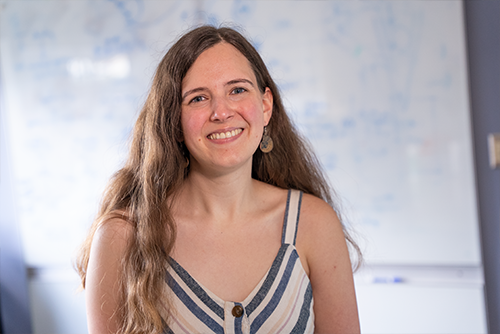Kathleen Morrill, PhD'23, Bioinformatics and Computational Biology
“Dogs are a fantastic model for understanding health. We can learn things about cancer, aging, behavior problems, and anxiety and compulsive behavior, all in an animal that we kind of take for granted, who’s by our side every day.”
Kathleen Morrill, PhD'23, did her dissertation on the behavioral genomics of domestic dogs. Morrill is first author on a paper published in Science that suggests that dog breeds are not good predictors of personality and behavior traits. Morrill and her mentor, senior author Elinor Karlsson, PhD, paired genome-wide association mapping technologies with more than 18,000 pet-owner surveys obtained through Darwin’s Ark, an open-source database of owner-reported canine traits and behaviors. Karlsson is associate professor of molecular medicine at UMass Chan and director of the Vertebrate Genomics Group at the Broad Institute of the Massachusetts Institute of Technology and Harvard University.
“Dogs are a fantastic model for understanding health,” Morrill said. “They share our homes with us, so they share a common environment and a lot of similar exposures to different things. Studying dogs is kind of our perfect companion for understanding how health problems emerge. We can learn things about cancer, aging, behavior problems, and anxiety and compulsive behavior, all in an animal that we kind of take for granted, who’s by our side every day.”
In 2022, Morrill received the Dean’s Award for Outstanding Mid-Thesis Research. She also received the Diane M. Riccio Morningside Graduate School of Biomedical Sciences Travel Award and the International Society of Psychiatric Genetics Early Career Investigator Program Travel Award to support her presentation on the canine model of compulsive disorders at the 2022 World Congress of Psychiatric Genetics.
When was she wasn’t poring over data, Morrill helped first-year students interpret data and learn coding for the statistical bootcamp. She has a bachelor’s degree in biological chemistry from Bates College, where she studied plant genetics. Rotating through different labs in her first year at UMass Chan allowed Morrill to find a new enthusiasm for computational biology, she said. Post-PhD, Morrill would like to embark on new large-scale genomics initiatives, especially those focused on human mental health.

